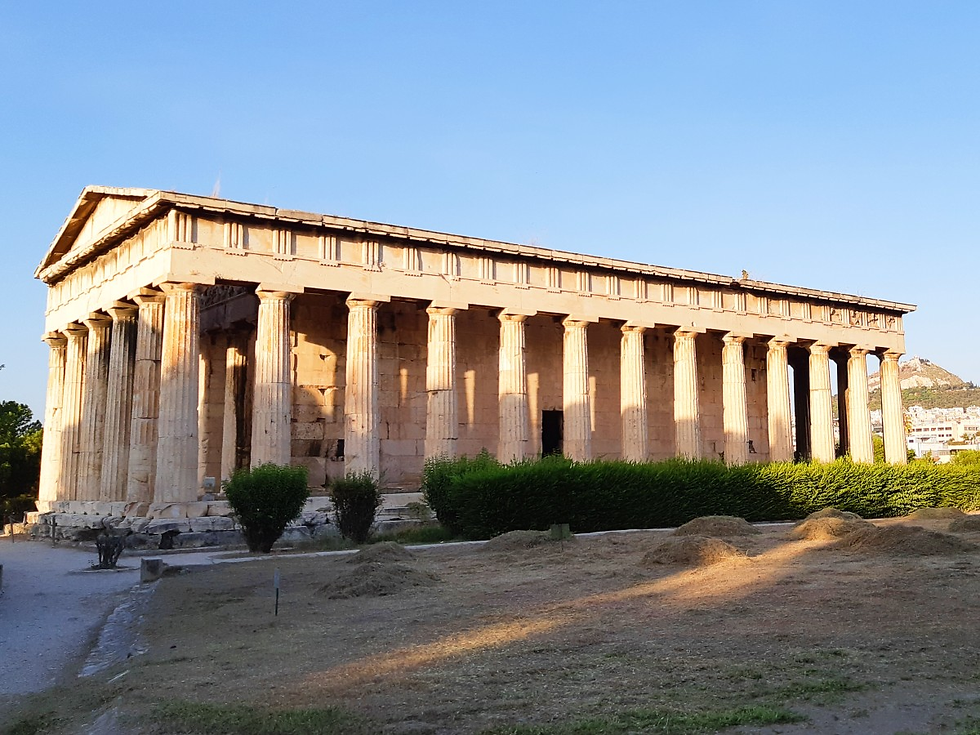Religious celebrations and traditional Greek festivals
- Johnny Ka
- Aug 15, 2023
- 3 min read
Introduction:
Athens, the cradle of Western civilization, is not only renowned for its ancient ruins and historical significance but also for its vibrant religious celebrations and traditional Greek festivals. Deeply rooted in Greek culture and mythology, these events offer a unique opportunity to witness and participate in age-old customs, rituals, and festivities. In this review, we will explore the rich tapestry of religious celebrations and traditional Greek festivals in Athens, immersing ourselves in the spiritual and cultural heritage of the city.
Easter:
Easter holds great significance in Greek Orthodox Christianity, and Athens comes alive with vibrant celebrations during this time. The Holy Week leading up to Easter Sunday is marked by solemn processions, church services, and the reenactment of the Passion of Christ. On Easter Sunday, the midnight Resurrection Service is followed by a joyous feast, where families gather to break the fast and exchange wishes of "Christos Anesti" (Christ is Risen). Fireworks light up the night sky, creating a festive atmosphere throughout the city.

Panathenaic Festival:
The Panathenaic Festival is an ancient Athenian festival dedicated to the goddess Athena, the patron deity of the city. This festival is celebrated every four years and culminates in the Great Panathenaia, a grand procession that honors Athena's sacred peplos (robe). The procession, accompanied by music and dance, winds its way from the Acropolis to the Panathenaic Stadium, where athletic competitions and performances take place. The festival showcases the cultural heritage and athletic prowess of ancient Greece.

Feast of the Dormition of the Virgin Mary:
On August 15th, Athens celebrates the Feast of the Dormition of the Virgin Mary, a significant religious holiday in the Greek Orthodox calendar. Pilgrims and worshippers flock to churches and monasteries throughout the city to honor the Virgin Mary and attend special religious services. Processions carrying icons and relics of the Virgin Mary create a solemn yet festive atmosphere, highlighting the deep devotion of the Greek Orthodox faithful.

Athens Festival:
The Athens Festival is a cultural extravaganza that encompasses a diverse range of performances, including music, theater, dance, and visual arts. Held during the summer months, this festival showcases both Greek and international artists, offering a platform for creative expression and artistic exchange. The Odeon of Herodes Atticus, an ancient amphitheater at the foot of the Acropolis, serves as a magnificent venue, adding a touch of grandeur to the performances. The Athens Festival is a celebration of artistic excellence and a testament to the city's cultural vitality.

Carnival (Apokries):
Carnival, or Apokries, is a festive season leading up to Lent and is celebrated with great enthusiasm throughout Greece. In Athens, colorful parades, masquerade parties, and lively street festivities mark this joyful period. Traditional costumes, music, and dance create a festive ambiance as locals and visitors join together to revel in the spirit of Carnival. The highlight of the celebrations is "Tsiknopempti" (Smoke Thursday), where the tantalizing aroma of grilled meat fills the air, enticing people to indulge before the fasting period of Lent begins.

Grape Harvest Festivals:
In early autumn, Athens and its surrounding regions come alive with grape harvest festivals, known as "Dionysia" in honor of the god Dionysus, the ancient Greek deity of wine and fertility. These festivals celebrate the completion of the grape harvest and the production of new wine. Visitors can enjoy traditional music and dance, taste local wines, and witness traditional grape-pressing rituals. The festivities provide an opportunity to experience the convivial spirit and warm hospitality of the Greek people.
Feast of St. Demetrius:
On October 26th, Athens pays homage to its patron saint, St. Demetrius, with religious processions and celebrations. St. Demetrius is revered as the protector of the city, and his feast day is an occasion for devout worship, as well as cultural and social gatherings. The Byzantine-era Church of St. Demetrius Loumbardiaris, located in the heart of Athens, is the focal point of the celebrations, drawing pilgrims and locals alike to honor the saint.

Conclusion:
Religious celebrations and traditional Greek festivals in Athens offer a window into the city's rich spiritual and cultural heritage. From the profound religious observances of Easter and the Feast of the Dormition of the Virgin Mary to the joyous festivities of the Panathenaic Festival and Carnival, these events showcase the deep-rooted traditions and communal spirit of the Greek people. Attending these celebrations allows visitors to not only witness the customs and rituals but also to immerse themselves in the vibrant atmosphere of Athens, forging a deeper connection with the city's timeless traditions and its hospitable inhabitants.




Comments